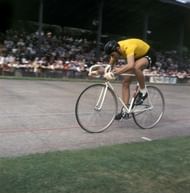Eddy had his last hurrah in the year 1974 as he clinched both the Tour de France as well as the Giro d’Italia, both for a record fifth and final time in his career. He also won his maiden Tour de Suisse that very year. The year 1974 also proved historic for Eddy as he became the first winner of the Triple Crown of Cycling when he won the World Cycling Championship for the third time as a pro. Only one more cyclist has since been able to repeat that feat: Stephen Roche in 1987.
Eddy started the 1975 Tour de France really well, and a sixth title seemed to be very well within grasp but some tragic occurrences shattered that dream. Eddy was punched in the abdomen by an irate spectator while he was still racing and he subsequently also suffered a major fall in stage 17 of the race that left him with a broken jaw, and contused knee and hip. Although he went on to finish 2nd, this tour is still regarded by some as his best, since in spite of the misfortunes that seemed to follow him everywhere, he still fought till the very end, attempting to regain the yellow jersey from Bernard Thévenet and finished just 2 minutes and 47 seconds behind him. He also went on to win three more “Monument” races that year taking his tally to 18.
The injuries sustained during the 1975 Tour de France took their toll on Eddy and the invincible “Cannibal” entered the twilight of his career. He started off the year 1976 on a good note winning his final “Monument” race at Milan-San Remo but a fall in the subsequent Tour of Flanders side-lined him for the rest of the season. He made an unsuccessful comeback to the Tour de France in 1977 finishing a distant 6th. Curiously, the winner, Thévenet, admitted to taking the banned substance cortisone and yet was not stripped of his title.
Eddy won his last race at the lowly criterium of Kluisbergen in July 1977 racing. Although he continued cycling for some time after that, finally good sense prevailed, and he brought a close to his glorious career at the end of the Omloop van het Waasland race in March 1978, riding for the C&A team. He thus bade the racing track goodbye with over a dozen records to his name, which included amongst others; 5 Tour de France and Giro d’Italia wins, 3 World Cycling Championship titles as a pro, 19 victories in the classic “Monument” races with a total of 28 classic race wins, and a massive 525 career victories as a pro cyclist. He also holds many unparalleled records in the Tour de France like having the most stage victories in a single tour (8) with a total of 34 stage victories, wearing the yellow jersey for 96 days in total; winning the general, points and mountain classification in a single edition of the tour (1969), winning the combativity awards for aggressive riding 4 time, and also winning the combination jersey the most number of times (5).
Eddy demonstrated his versatility when he set the hour record in Mexico City in 1972 by covering an astounding 49.431 km at high altitude, a record that stood till 1984. Had cycling been a part of the Olympics then, one can only surmise how many medals he would have won. One fascinating observation regarding Eddy’s professional career is that his annual percentage of wins followed a normal distribution pattern starting with a low 13 % in 1965 before rising to a career high of 45 % in 1971 and finally ending in a dismal 0 % in 1978.
In the years following his retirement, Eddy meddled in a variety of roles starting from being a race commentator to a coach and advisor. But he is most famous for setting up the Eddy Merckx Cycles company in Belgium in 1986 that has attained iconic status with the passage of time.
The days of Eddy Merckx are long gone and a certain Chris Froome is now wearing the yellow jersey that Eddy wore with aplomb more than four decades ago. Drug tests have become much more stringent and cycling is still struggling to emerge from the dark age of doping that has rocked it since the turn of the new millennium. But in all these years, no man has come even close to matching Eddy’s illustrious career graph. Eddy’s dominance of pro-cycling has become a part of folklore. He was the first superstar of the sport, an epitome of class, with a never say die attitude that won him the nickname of “The Cannibal”. And in these troubled times, there is a need for another Eddy Merckx to emerge from the ashes, who can show the world that no matter how tough the circumstances are, it is always talent and perseverance that prevail in the end.

